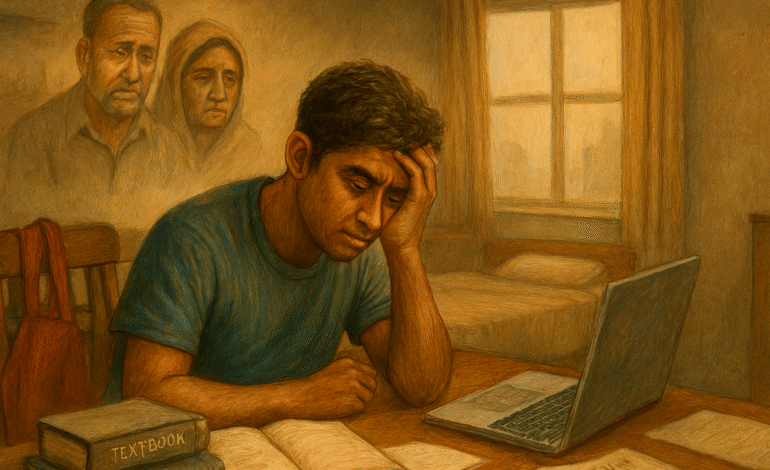Struggles of Bangladeshi Students Abroad

The Hidden Cost of Studying Abroad
Bangladeshi students studying Abroad embark on their journeys with dreams of achieving higher education, international exposure, and brighter futures. Each year, thousands of young people leave behind their families, friends, and the comfort of home to chase opportunities in foreign universities. Their success stories often inspire many back home, but behind these achievements lie untold sacrifices, hidden struggles, and challenges that rarely come to light.
First-Year Survival Challenges
At home, families often see studying abroad as a badge of pride. Relatives boast about children pursuing degrees in Canada, the United States, the United Kingdom, Finland, Denmark or Malaysia. Yet the emotional and financial tolls that come with this decision are rarely acknowledged. For Bangladeshi students studying Abroad, the first year often feels like survival mode. They are suddenly thrown into a world where culture, weather, food, and even daily routines are drastically different.
Academic Struggles in a New System
One of the biggest challenges faced by Bangladeshi students studying Abroad is adapting to academics in foreign institutions. Unlike the traditional exam-heavy education system in Bangladesh, many universities abroad emphasize critical thinking, group work, presentations, and active class participation. This shift, combined with language barriers and unfamiliar teaching methods, can make the classroom a stressful place.
Financial Pressure
Beyond academic hurdles, financial struggles form a constant shadow. Tuition fees may appear manageable at first, but hidden costs soon begin to pile up. Rent, groceries, transportation, health insurance, and textbooks consume a significant portion of student budgets. Many Bangladeshi students studying Abroad are forced to take up part-time jobs, often working long hours in restaurants, delivery services, or convenience stores.
“When I first arrived, I thought I had planned my budget well. Tuition seemed manageable, and I believed I could live modestly. But the hidden costs started adding up—rent, groceries, transportation, health insurance, even simple things like buying textbooks. Suddenly, the numbers didn’t add up anymore. I had to take a part-time job at a restaurant. Some nights I work until 1 a.m., only to wake up early for classes the next day. Every plate I serve reminds me that I’m not just studying—I’m also fighting to keep this dream alive,” said Ehaan, who is pursuing a Master’s in Public Relations and Communication at Griffith University in the UK.
Emotional Burden and Homesickness
The emotional cost of studying abroad is just as heavy. Loneliness and homesickness are common, as students miss family celebrations, weddings, and Eid gatherings. “It’s exhausting, but there’s no choice. My family back home is already sacrificing so much to send me here”. Phone calls and video chats can never fully replace the comfort of home-cooked meals and family warmth. For many Bangladeshi students studying Abroad, cultural differences make them feel like outsiders, further deepening the sense of isolation.
Mental Health Challenges
Mental health struggles are another hidden challenge. Anxiety, depression, and stress often remain unspoken due to cultural stigmas around mental health in Bangladesh. Many Bangladeshi students studying Abroad suffer silently, lacking access to affordable counseling services. The constant pressure to succeed, combined with isolation, creates an environment where mental well-being is at risk. Sometime’s I feel lonely. “I feel like giving up, but I keep pushing for my dreams and responsibilities that I have on my own,’ Sakib from Woosong University in South Korea.
Finding Community and Coping Strategies
Despite the hardships, some students find coping mechanisms to make life more bearable. Bangladeshi student associations and diaspora communities often play a key role in offering support. They organize cultural programs, religious gatherings, and cooking sessions where students can share familiar Bangladeshi food. Such initiatives reduce feelings of homesickness and create a sense of community.
The Family’s Sacrifice Back Home
The struggles of Bangladeshi students studying Abroad are not limited to those who leave. Families back home also endure the emotional strain of separation. Parents often sacrifice their savings, sell property, or take loans to fund their children’s education. While proud, they live with constant worry about their children’s safety and well-being.
“When my son left for Canada, we were proud but the house felt empty overnight. We sold a piece of land to cover his tuition, and every month we cut down on our own expenses to send him money. We always worrying—has he eaten, is he safe, is he lonely? His success is our dream, but the sacrifice weighs on us every day,” said Sunny’s father, whose son is in Canada for a Master’s programme.
The Risk of Brain Drain
Another growing concern is brain drain. Many Bangladeshi students studying Abroad, after enduring years of struggle, choose to settle permanently in their host countries. The lack of career opportunities, political instability, and infrastructural challenges back home make returning less appealing. While their remittances contribute to Bangladesh’s economy, the loss of young, educated professionals weakens the country’s long-term development prospects.
Silver Linings and Long-Term Benefits
Yet, despite the numerous challenges, the journey is not without rewards. Bangladeshi students studying Abroad gain exposure to global perspectives, advanced research facilities, and multicultural networks. These experiences often shape them into resourceful, independent, and resilient individuals. For those who return, their skills and insights contribute positively to Bangladesh’s growth.
Building Better Support Systems
Ultimately, the struggles of Bangladeshi students studying Abroad highlight the need for systemic reform. Better scholarships, stronger embassy support, more comprehensive university programs, and improved mental health services could significantly ease the burden. At the same time, Bangladesh itself must work towards building stronger local education systems and career opportunities, so that studying abroad becomes a choice rather than a necessity.
A Journey of Sacrifice and Growth
In the end, the story of Bangladeshi students studying Abroad is one of both struggle and resilience. It is a journey filled with sacrifices—financial, emotional, and personal—that often go unseen. But it is also a journey of growth, discovery, and determination. Behind every success story lies a quiet battle against loneliness, financial hardship, and cultural challenges. Recognizing these realities is the first step towards supporting the next generation of Bangladeshis who dream of making their mark on the global stage.







